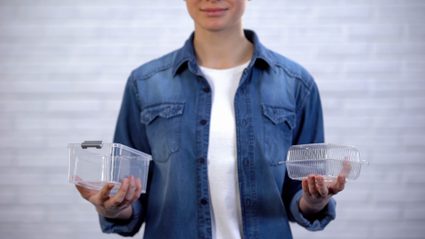This calculator was last updated on 22/09/2020. It is currently not being updated, and the recommendations about masks may have changed since then.
This year has brought us numerous unpleasant surprises — first, there was bad news regarding the state of the world's ecosystems. Then, the COVID-19 pandemic. While masks and gloves prevent the spread of the virus, an increasing amount of them and other plastics are being thrown into the oceans 🌊
We are disposing 129 billion face masks and 65 billion plastic gloves every month globally, according to in the journal Environmental Science and Technology. 🎐 Have you heard that soon we'll have ? According to , it takes 450 years for a face mask to decompose!
COVID-19 influence on our habits
Even if you were using only reusable paper or material bags, choosing ecological transportation methods, and buying only second-hand goods, this pandemic has undoubtedly set you back a couple of steps. We currently order takeaway (in plastic boxes) instead of going to restaurants and buying things with plastic coverings to protect ourselves from touching anything that could pass the virus. All these things contribute to our individual plastic footprint. More on the topic of plastic footprint in our plastic footprint calculator. Not to mention medical supplies, such as masks, gloves, and special suits.
But let's not put all of the guilt on us, the customers. It's been known for a while that the are giant companies - Coca-Cola, Nestle, and PepsiCo have been the biggest plastic polluters for two years in a row.

Face mask footprint
Let's go further into the details. If wearing masks becomes obligatory in the UK 🇬🇧, and everyone wears one surgical mask a day for a year, after 365 days, there will be .
In Germany 🇩🇪, a country with a population four times smaller than the US, if all citizens were to wear surgical masks, they would need 12 billion masks. And it equals around 720.000 tons of CO2-equivalent. That is 141,114 passenger vehicles driven in for one year!
The of one N95 mask is 0.05 kg CO2-equivalent per face mask. For cotton face masks, the number is 20% higher, reaching 0.06 kg CO2-equivalent. In comparison, one kilogram of apples is 0.4 kg CO2-equivalent.
So why are reusable masks more eco-friendly? You use around five cotton masks in a month and wash them every day, while N95 masks need to be disposed of daily.
Overall, one person that uses cloth masks in a month generates even 5-6 times less CO₂ footprint than N-95 masks (5 masks vs. 30 masks). What's more, than disposable masks.
🙋 You can read more about the differences between the various types of face masks available today with our coronavirus mask calculator.
Wildlife and masks
The thing is, it's not just the plastic trash itself that worries us. It's the influence it has on animals living in the oceans, swimming in the rivers, or just the ones staying in the woods. The problem on the macro-scale are animals getting tangled in the surgical masks floating everywhere in the water. Snip the straps after using a mask, .
The second issue is that the masks won't biodegrade. They stay there for years, floating in the seas or thrown by the waves to the shore.
Finally, the third aspect. Even though the masks don't biodegrade, they eventually . That . 🐟🐟🐟 Eaten by fish and microorganisms, it may, in the long-term, cause chronic health problems in humans.
🔎 Are you wondering what exactly the importance of wearing masks during a pandemic like the COVID-19 pandemic is? Find that out with our mask vs. no mask calculator.
How to use COVID-19 Waste Calculator
It’s simple and intuitive! First, you need to choose if you:
- Need Personal Protective Equipment for regular use,
- Are a medical professional,
- Take care of a sick person.
It does make a difference. If you deal with COVID-19 patients directly, safety issues always go first.
Let’s move on to the face protection section. Choose how many surgical (medical) masks and filters you need per week, month, etc. Also, do not forget to determine the number of reusable cloth masks you have.
The second section focuses on hand protection – either gloves or hand sanitizers. Again, check how many pairs of gloves you use in one week, month, or maybe a year. The same goes for hand sanitizer bottles. Control what bottle size you buy most often.
This calculator estimates the environmental cost in a certain amount of time. Choose and change between one month, three, or six months up to a year and see what difference you can make by changing your habits.
Being eco-friendly and responsible at the times of pandemic
To be clear, there's nothing more important than complying with all of the recommendations that'll keep you safe. However, there are some things you can introduce into your life to decrease your impact on the environment:
❗ Instead of using disposable masks – start with cloth masks. According to the CDC, they are just as good for regular people who don't work with COVID patients.
❗ The same thing goes for gloves – in most situations, a good wash with water and soap or a hand sanitizer is enough.
❗ Now that we've mentioned hand sanitizers. They're often sold in small plastic bottles. How about buying bigger bottles and then dividing the liquid into your smaller, reusable bottles? That saves a couple of small plastic bottles.
✅ To all the medical workers who have been working tremendously since the beginning of the pandemic - it's clear that you cannot avoid using disposable surgical cloth masks, filters, and gloves. And there's nothing wrong with that. By that, you protect yourselves and, even more importantly, your patients.
The purpose of wearing a mask
We wear a mask to protect others, yourself, and your loved ones from getting infected and being admitted to the hospital 💕
It's been proven that a sick person wearing a mask (or someone who's just spreading the disease without any symptoms) significantly lowers infection risk. That, along with social distancing, is almost a completely efficient way to save some lives. Read more about social distancing in our social distancing calculator.

Water and soap vs. hand sanitizers
According to the CDC, washing your hands with water and soap is the best way to halt an infection's spread on your hands. Why is it better than hand sanitizer? 🧴 Here are some of the reasons:
- A proper hand sanitizer needs to contain at least 60% of alcohol to be effective.
- People tend to use too little hand sanitizer per use.
- Hand sanitizers do not kill all germs; e.g., Clostridium difficile (which causes pretty nasty diarrhea) can only be gotten rid of with a pleasant water and soap rinse.
- Hand sanitizers may not work on already dirty hands, i.e., those with dirt or grease on them.
Still, this should make you hesitate to use hand sanitizer! They can still stop you from spreading germs with your bare hands. Let's not forget about ecology too. When using hand sanitizer, consider buying it in larger bottles and then dividing it into smaller, reusable bottles. You'll save plenty of plastic – and probably some money, too. Find out how many bottles of hand sanitizers you'll need based on your usage using our hand sanitizer calculator.